Have you ever come across an ad on Facebook claiming to be an “Amazon Clearance Sale” offering expensive items at incredibly low prices? If so, you might have encountered the Amazon Clearance Sale Scam. This scam involves fake online shops such as oruzora.com and skyriverca.com, which lure victims with unbelievable deals. Read on to learn more about this scam and how to protect yourself.
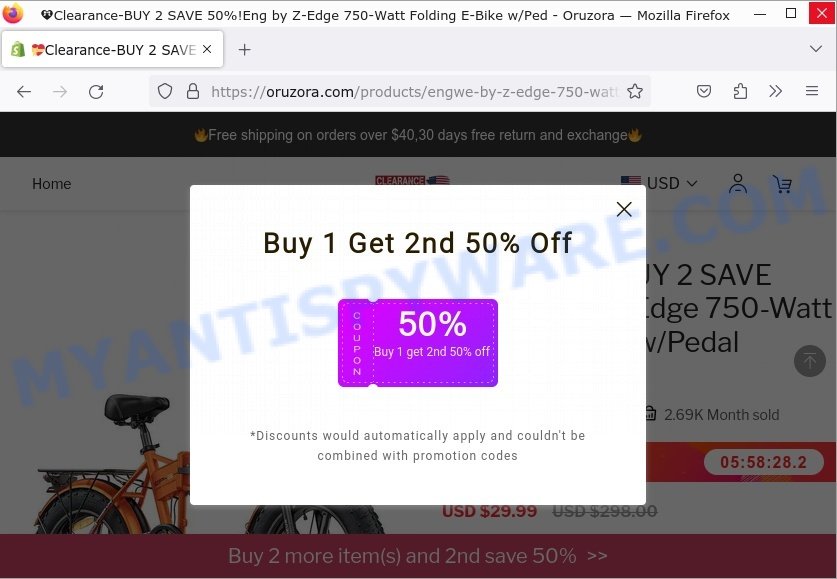
Quick Links
- What is Amazon Clearance Sale Scam
- Signs of Amazon Clearance Sale Scam
- How Amazon Clearance Sale Scam Works
- What to do if you become a victim of Amazon Clearance Sale Scam
- Summary table for Amazon Clearance Sale Scam
What is Amazon Clearance Sale Scam
The Amazon Clearance Sale Scam is a type of online shopping scam that uses the name of Amazon to trick victims into believing they are purchasing items from a legitimate clearance sale. The scam involves fake online shops that post ads on Facebook offering expensive items at incredibly low prices.
Signs of Amazon Clearance Sale Scam
Some common signs that you might have encountered an Amazon Clearance Sale Scam include:
- The online shop is recently created and has hidden contact details.
- The shop offers expensive items at unbelievably low prices.
- The shop uses enticing slogans like “Clearance Sale”, “Free return”, “Huge Discounts”, “Limited Time Sale”.
- The shop has a time counter on the product page, creating a sense of urgency.
- The shop has no social media presence or links to any social media platforms.
- Customer complaints about delivery issues or not receiving items.
How Amazon Clearance Sale Scam Works
The Amazon Clearance Sale Scam begins with an enticing ad posted on social media platforms like Facebook. The ad claims to be an “Amazon Clearance Sale” and offers high-value items such as electric bikes at incredibly low prices. For example, an electric bike that normally costs hundreds of dollars is offered for just $29.99 or $39.98. The ad often includes phrases like “Clearance-BUY 2 SAVE 50%” or “Buy 1 get 2nd 50% off” to further entice potential victims.
When a user clicks on the ad, they are redirected to a recently created online shop with a professional-looking design and product descriptions. The website may include a countdown timer to create a sense of urgency, encouraging the user to make a purchase before the “sale” ends. The website may also display a high number of positive reviews and a large number of items sold to create an illusion of legitimacy and popularity.
Once the user decides to make a purchase, they are directed to a checkout page where they are asked to provide personal and financial information. The website may offer “free shipping on orders over $40” and “30 days free return and exchange” to make the deal seem more attractive. After the user completes the purchase, they receive a confirmation email from the scam shop.
However, the purchased item never arrives. The user may attempt to contact the shop through the provided email address, but they receive no response. The scam shop may disappear after a short period, leaving the user with no way to get their money back. The scammers may use the collected personal and financial information for further fraudulent activities.
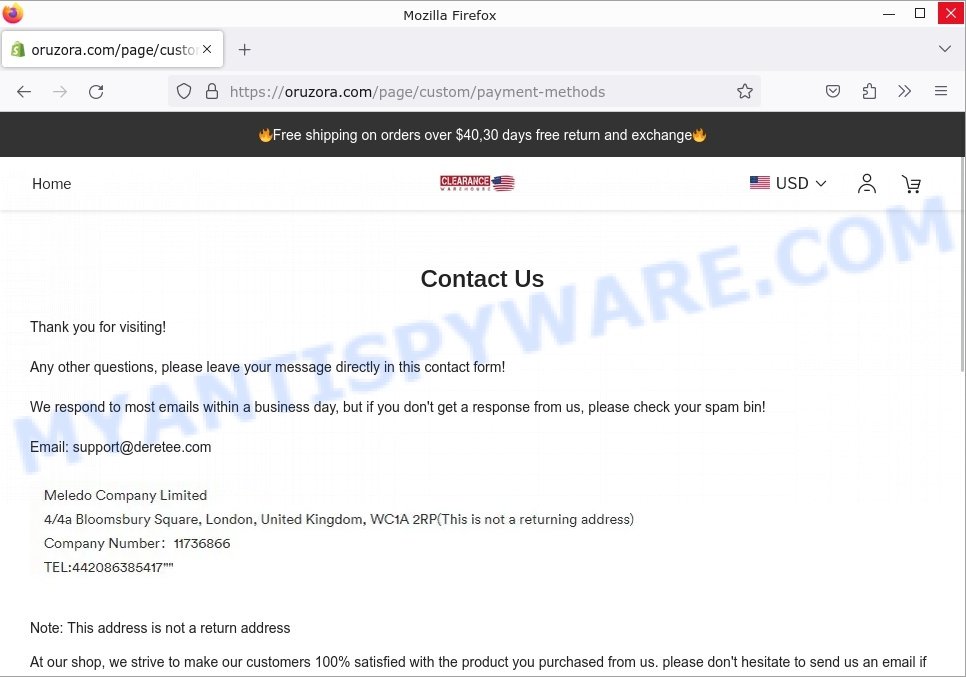
What to do if you become a victim of Amazon Clearance Sale Scam
If you’ve fallen victim to the Amazon Clearance Sale Scam, follow these steps:
- Contact your bank or credit card company to report the fraudulent transaction and request a chargeback.
- Report the scam to your local authorities and to the platform where the ad was posted.
- Change your online shopping passwords and enable two-factor authentication if available.
- Be wary of future online shopping deals that seem too good to be true.
Unveiling Similar Scams: Deceptive Tactics Exploited by Fraudsters
As the Amazon Clearance Sale scam gains momentum, it is crucial to be aware of similar scams that operate on the same deceptive principles. These scams often target popular retail brands, exploiting their reputation to lure unsuspecting shoppers into fraudulent schemes. Below, we will explore a range of examples that highlight the diversity of such scams, showcasing how scammers employ similar tactics to trick consumers. By understanding these common patterns, you can enhance your ability to recognize and avoid scams, protecting yourself from falling victim to their deceitful practices.
Here are some notable examples of scams akin to the Amazon Clearance Sale scam, shedding light on the pervasive nature of online fraudulent activities: Bed Bath & Beyond Clearance Sale Scam, Costco Clearance Sale Scam, and Macy’s Clearance Sale Scam.
- Mazalti.com AZU NECKLACE
- Visgateca.com DEWA 20-VOLT COMBO KIT
- Seafoodteam.com Fresh Maine Lobster Tails
- Hdemw.shop Freestyle Rocker
- Shaelan Xosha Factory Outlet Scam Dual Motor Electric Scooter
Summary table for Amazon Clearance Sale Scam
| Name | Amazon Clearance Sale Scam |
| Type | Online Shopping Scam |
| Damage | Financial loss, potential identity theft |
| Distribution | Facebook Ads |
| Tactics | Impersonation, false advertising, fear of missing out |
| Scam stores | oruzora.com, skyriverca.com, etc |
| Prices | 1000W 48V/17.5Ah removable battery 31MPH for $39.98; 750-Watt Folding E-Bike w/Pedal for $29 |
| Prevention Tips | Be skeptical of online deals that seem too good to be true, verify the legitimacy of online shops before making a purchase, use secure payment methods when shopping online |
| Reporting Info | Report to local authorities, your bank or credit card company, and the platform where the ad was posted |
Conclusion
The Amazon Clearance Sale Scam is a serious threat that exploits the trust of online shoppers. It’s crucial to stay vigilant and skeptical of any online deals that seem too good to be true. Always verify the legitimacy of online shops before making a purchase and use secure payment methods when shopping online. Remember, if a deal seems too good to be true, it probably is.
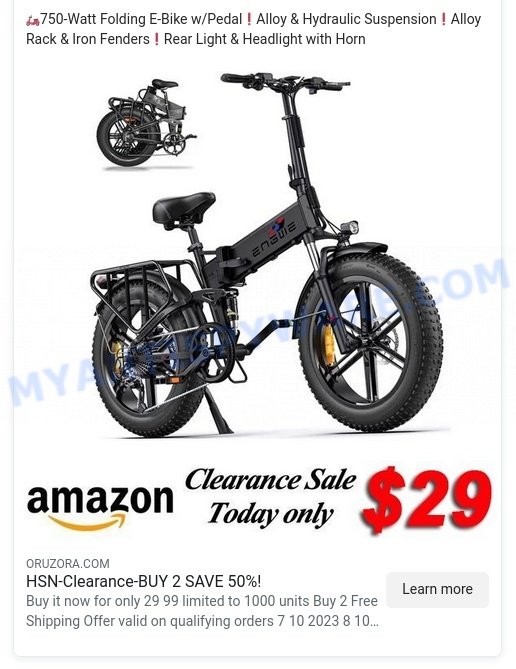
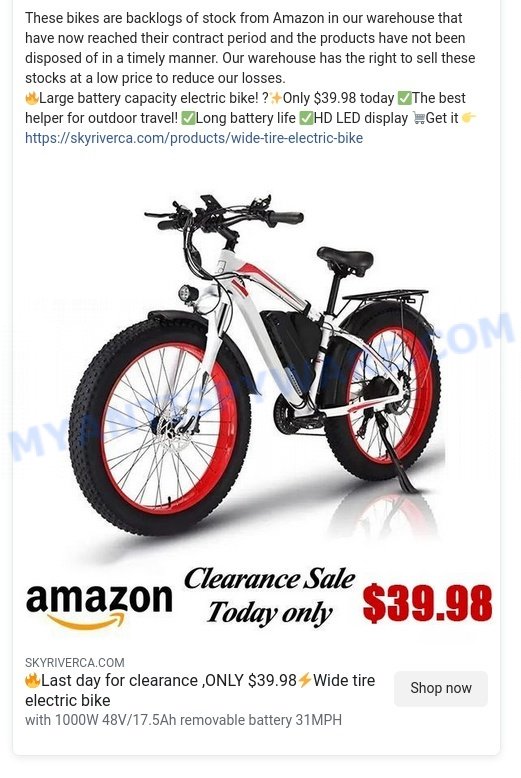
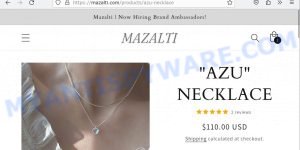



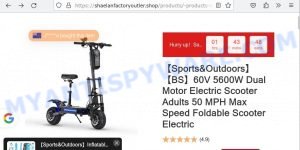


















Lately Apple products such as iPhone, iPad, and MacBook Air have been posted on the ads showing up in Facebook. I haven’t actually tried ordering anything, but these offers sound fishy. Apple actually offers refurbished devices online, but the prices are a lot higher than the scam ads are asking.
They got me, most likely “cause I was thinking of getting a new laptop and there it was, “Costco” and
“Amazon”, two of my favorite people coming together to offer me a great deal on Facebook. Sure, it was too good to be true. And it wasn’t true!!! I am amazed that Facebook, Amazon and Costco don’t put a stop to these illegitimate uses of their brands. Sure isn’t helping their reputations.